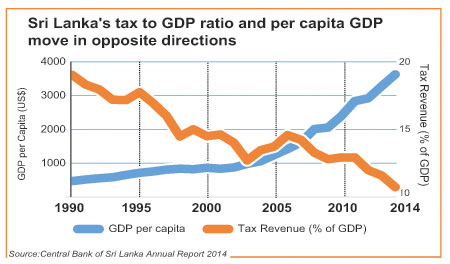|
Capital Gains Tax to be introduced:
Move to resolve looming crisis
By Rukshana Rizwie and Isuri Kaviratne
A proposal for the introduction of Capital Gains Tax (CGT) and tax on
commodities was approved by the Cabinet Committee on Economic Management
(CEM) at a meeting last week.
 The
measures are aimed at resolving a revenue crisis to meet the growing
expenditure of the country. The
measures are aimed at resolving a revenue crisis to meet the growing
expenditure of the country.
The CEM had proposed to increase the direct tax from 10 to 20 percent
and the income tax and company tax from 15 to 17.5 percent. Minister of
International Trade Sujeewa Senasinghe said the current tax revenue is
10 percent of the GDP whereas the tax owed to the government is 20
percent.
“Doubling the tax revenue would help the government to develop better
infrastructure and grant concessions for the needy.” He cautioned that
benefit systems, such as the pension schemes will be curtailed gradually
as people will be encouraged to save for their retirement.
Sri Lanka’s economy is growing at six percent. Hence it is envisioned
that with new tax reforms, the rate could go up to three times the
current rate. “With the support of the IMF team who is due in late March
or early April, we will start fund-supported development projects such
as the setting up of vehicle manufacturing factories and the removal of
the EU fishing ban, strengthening tea and rubber exports.”
Economist Executive Director at the Institute of Policy Studies Dr.
Saman Kelegama said the government is on the right track.
“At present, the tax revenue of the government is not at a
satisfactory level – around 11.8 percent of the GDP,” he said. “We need
to enhance this to about at least by 1.7 percent of the GDP quite soon
to make it around 13.5percent to meet the growing expenditure of the
economy.”
He explained that our income taxes amount to 2.7 percent of the GDP
when most developing countries reap around 4 to 5 percent of the GDP
revenue from income taxes. “Hence a CGT will certainly enhance the
income tax revenue.”
He referred to the 2010 Presidential Taxation Commission
recommendations to increase tax revenue citing that Sri Lanka has become
highly indebted due to excessive borrowing by successive governments. A
Verité Research suggests the tax rate in a country should increase
parallel to the GDP: though Sri Lanka’s per capita GDP has increased
over seven times since 1990, tax revenue has halved. ‘Therefore, the
government needs to improve its tax revenue for development projects and
not to run into budget deficits.’
Chief Economist at the Ceylon Chamber of Commerce Anushka Wijesinha
was taking a wait-and-watch approach to the revenue crisis. “These are
not tax reforms, they are piecemeal tax changes by a government
responding to an urgent revenue need,” he said. “The revenue crisis the
country is facing is a result of years of postponing more comprehensive
tax and expenditure reforms.”
Referring to the economic climate, he said there is an “issue of
inconsistency and uncertainty with regard to tax policy which is
undoubtedly affecting business.”
“If we want to continue public spending on sectors such as education
and health, then tax revenue is a huge part of that equation,” he said.
“But the country has to decide whether we are going to pay higher taxes
to fund those sectors of spending or to reduce public spending and pay
less tax.”
The Treasury and the Ministry of Finance were not available for
comment. |

